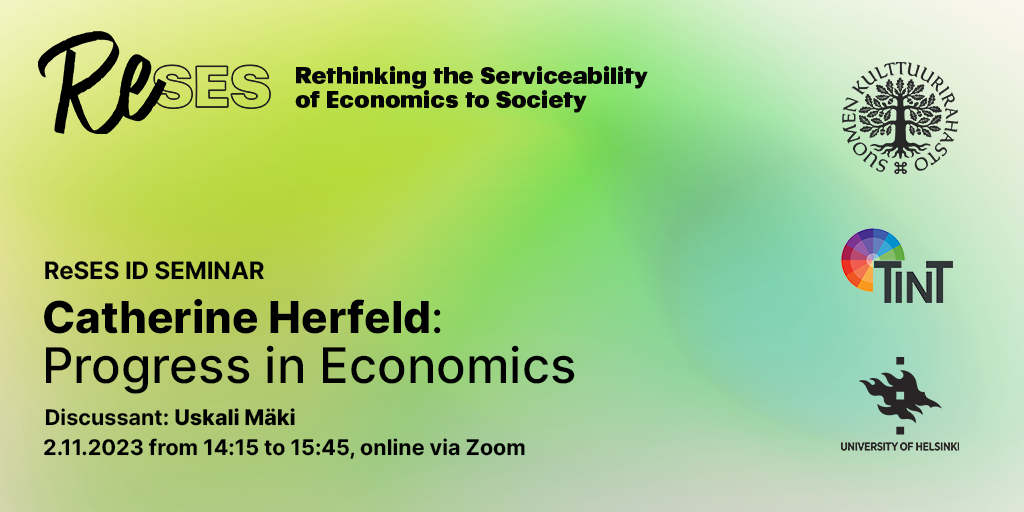
We are happy to invite you to our next ReSES ID Seminar featuring a talk by Catherine Herfeld on “Progress in Economics”. In this talk, she will discuss a specific kind of progress that occurs in most branches of economics today: progress involving the repeated use of mathematical models.The talk will draw on the recent literature on model making, model transfer, and model application in philosophy of science to look at the case of economics.
The discussion will be led by Uskali Mäki, while N. Emrah Aydinonat will chair the seminar. This seminar will take place via Zoom on Thursday, November 2nd, 2023, from 14:15 to 15:45 (EEST, Helsinki time).
Event: ReSES ID Seminar
Speaker: Catherine Herfeld (University of Hannover)
Title of the talk: Progress in Economics
Discussant: Uskali Mäki
Time: 2nd November, 14:15-15:45
Place: Online via Zoom
Pre-register by sending email to contact@reses-argumenta.fi
ABSTRACT
In this talk, we discuss a specific kind of progress that occurs in most branches of economics today: progress involving the repeated use of mathematical models. We analyze how economics progresses by discussing not only when progress occurs in economics but also when it does not. By analyzing progress in economics enabled by mathematical models, we also attempt to understand when progress is altered and how new methodological developments are considered to be potentially progressive.
To do so, we draw on the recent literature on model making, model transfer, and model application in philosophy of science to look at the case of economics. Particularly, we start from the template account of understanding models as based on what Paul Humphreys and others call “templates,” which are mathematical or computational forms that are flexible enough to be applicable to various kinds of target systems (Humphreys 2002, 2004, 2019, Knuuttila and Loettgers 2016, 2020). Generally, a template constitutes “a pattern that can serve as a common starting point for the development of a product but that can be adapted for the purpose at hand” (Humphreys 2019, p. 116, fn. 20). The concept of a template is used to clarify how using such templates within one domain, such as a discipline or subdiscipline, aids “the acquisition of explicit knowledge and understanding, and to explore similar questions when they are applied across domains” (ibid., p. 114).
Thinking of economic modeling as grounded on templates allows us to see how the application of economic models to other target systems within economics might ensure a repeatable process that leads to the definition and solution of new problems in the respective domain. Economics is chiefly a problem-solving science, in particular where model making and application predominate. We can even observe instrumentalist attitudes in economics which can best be captured by the functional account of progress (Shan 2019). To fruitfully discuss how large parts of economics progress, we thus adopt such a functional account of progress in this talk. We argue that progress in economics occurs through the use of what we call “common recipes” and model templates for defining and solving problems of relevance for economists. We thus argue that progress in model-based economics occurs when a model is considered sufficiently useful to be reapplied to define and solve pending or new problems. Progress is disrupted when models are considered useless for those purposes and advances again when a model is developed that proves useful in this respect.
We further support our argument by discussing the case of 20th century business cycle research. More specifically, we discuss a template that Jan Tinbergen formulated to model the business cycle a specific as a case for formulating and applying a model template in economics. By presenting this case study in detail, we show how model templates are not only reapplied to different phenomena. We also show how scientists first develop them and how, once they are considered less useful, they are replaced with new ones. Finally, our case also illustrates that it is not only the mathematical structure that is reused but that such reuse also requires a shared conceptual vision of the core properties of the phenomenon to be studied. Our analysis reveals that functional progress in economics occurs when a shared conceptual vision of the phenomenon allows a model template to be reused to define and solve problems. Progress can be hampered when templates are considered useless for specific problems, for which a change in the conceptual vision of the phenomenon can be responsible. However, functional progress can continue, once a new model template is developed and the conceptual vision underlying it is accepted.
CATHERINE HERFELD
Catherine Herfeld is Professor of History and Philosophy of Economics at the University of Hannover, Germany. Her research interests fall into the fields of philosophy of the social sciences, history of economics, and philosophy of economics. Catherine has recently received an ERC Starting Grant for a project entitled Model Transfer and Its Challenges in Science: The Case of Economics, which allows her to conceptually and empirically study why and how models are transferred across different scientific domains and what such model transfers imply for our understanding of scientific progress.
RESES ID SEMINAR
This is the 4th event in our ReSES ID Seminar series, which is a part of the Rethinking the Serviceability of Economics to Society project (funded by the Finnish Cultural Foundation). At every ReSES ID Seminar, attendees can expect a central presentation, succeeded by a discussion facilitated by a designated commentator. The audience is encouraged to participate and offer their questions and comments. We welcome anyone interested in these subjects to join us and engage in valuable discussions and reflections. Students, in particular, are cordially invited to attend, and we look forward to their presence.


